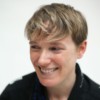Writers not Users: A Masterclass on Living & Writing in the Age of AI
Beyond next word prediction: rethinking poetry, technology and creative solitude.
Do the algorithms of today take us further and further away from ourselves and from the ‘great inner solitude’ that Rilke advised poets to seek? How does our use of technology impact our engagement with our selves and our poetry? Can large language models be transformed from next word predictors into collaborators in linguistic subversion? This course offers an opportunity to refocus our attention as writers, to critically engage with the technology that has made headlines over recent years, and to gain a deeper understanding of the structures behind it.
We will put these tools in historical perspective, taking a long view that positions large language models as (what could be) the latest tool in the context of procedural writing techniques – a tradition that stretches back via the Oulipo to Dada. The intellectual extractivism of today’s models can be critiqued in relation to familiar questions: when does cut-up writing become plagiarism? When is ‘found writing’ appropriation? And where does the notion of ‘intelligence’ come from?
As Kate Crawford has said, AI is neither artificial nor intelligent, and as Jeanette Winterson observes, ‘alternative intelligence’ might be more accurate, ‘we need alternatives’ (12 Bytes). We will approach large language models from feminist, queer, and postcolonial perspectives. As well as engaging with critique of authors including Julia Bell, Legacy Russell and Yasmin Ibrahim, we will read the work of writers who have played with these tools, often outside of big tech – the encounters with large language models of a fictional poet based on Marianne Moore from author Sean Michaels, the work of artists queering AI such as Jake Elwes’ AI drag performers, and the computational code poetry of Lillian-Yvonne Bertram.
We will rethink the ways we engage with technology (social media, our phones, algorithms) on a daily, hourly basis. As well as the option to explore working with large language models critically and playfully, at other times, we will step away from technology entirely, to reflect on how the rhythms of our daily lives impact our attention, and therefore our writing. This course will include writing tasks and challenges, with and without technology. We will question when ‘writing’ becomes ‘generating’, experimenting with prompts and procedural writing techniques. The ways large language models are changing the practice of writing can prompt us to consider how our own minds work, and enable us to explore alternative processes of writing and re-writing, to understand our thought patterns, our ‘voice’, our sentences, lines, and personal relationships with solitude and response.
No technical knowledge is required, and minimal technical knowledge will be gained! While we will engage with histories, contexts, ethical questions and wider understandings of the technology behind today’s algorithms, this course is about challenging our creativity and poetic practices rather than building technical knowledge in AI or coding. We will re-write our relationship with technology, reclaiming attention and authorship as poets of the digital age.
Masterclasses are an expanded version of our International Courses, with a much deeper consideration of technical craft and critical theory. These 12-week courses (maximum 12 places) are for advanced students only, and fluency with poetic language and ideas will be assumed. There are no live chats and they are suitable for UK and International students.
Concessions & Accessibility
To apply for a concession rate, please send relevant documentation showing your eligibility for one of our concessions to [email protected]. Conditions of eligibility are detailed here. If you have any questions or wish to be added to the waiting list of a sold-out course, please email [email protected].
What to Expect
Please check the left hand side of this page for information on how this course works in practice, under the heading ‘Course Style‘. If you’re unsure as to what any of the terms there mean, or if this course is a good fit for you, please visit our What to Expect page which includes some further information on how our courses function.
Image credit: @googledeepmind
About Hannah Silva  View Profile
View Profile
Hannah Silva is a writer and performer confronting big ideas through formal innovation and a seriously playful approach to language, voice and technology. Silva’s work spans BBC radio dramas, a sound poetry/music record, Talk in a bit, and two decades of critically acclaimed poetry and performance. Their eighth BBC radio play, An Artificially Intelligent Guide to Love was the starting point for My Child, the Algorithm (Footnote Press), a genre-fluid memoir exploring love and queer single parenting, woven into glitchy and poetic contributions by an early, open source large language model, and a toddler. It was named a 2023 Granta book of the year. Their debut poetry collection Forms of Protest (Penned in the Margins) was Highly Commended in the 2013 Forward Prizes. Silva’s second poetry collection Crow, Pirate, Fly is forthcoming with Bad Betty Press.
"Poetry School Online Courses have helped me get back into writing and it's great to have a creative outlet and focus, I can't wait to book my next course!"
 Hoax Poetics: A Fakery Masterclass
Hoax Poetics: A Fakery Masterclass Forms of Storytelling Masterclass: A Story is a Story is a Story
Forms of Storytelling Masterclass: A Story is a Story is a Story Essential Patterns in Poetry Masterclass
Essential Patterns in Poetry Masterclass